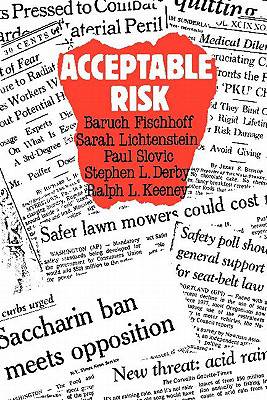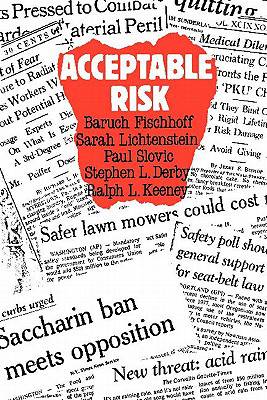
Wil je zeker zijn dat je cadeautjes op tijd onder de kerstboom liggen? Onze winkels ontvangen jou met open armen. Nu met extra openingsuren op zondag!
- Afhalen na 1 uur in een winkel met voorraad
- Gratis thuislevering in België vanaf € 30
- Ruim aanbod met 7 miljoen producten
Wil je zeker zijn dat je cadeautjes op tijd onder de kerstboom liggen? Onze winkels ontvangen jou met open armen. Nu met extra openingsuren op zondag!
- Afhalen na 1 uur in een winkel met voorraad
- Gratis thuislevering in België vanaf € 30
- Ruim aanbod met 7 miljoen producten
Zoeken
Acceptable Risk
Baruch Fischhoff, Sarah Lichtenstein, Paul Slovic, Steven L Derby, Ralph Keeney
Paperback | Engels
€ 52,95
+ 105 punten
Omschrijving
The common denominator of a growing number of hard decisions facing modern societies is the need to determine 'how safe is safe enough?'. The authors begin by defining acceptable-risk problems and analysing why they are so difficult to resolve, considering such issues as uncertainty about their definition, lack of relevant facts, conflicting and conflicted social values, and disagreements between technical experts and the lay public. Drawing on their own experience in risk management as well as the relevant research literatures, they identify and characterise the variety of methods that have been proposed for resolving acceptable-risk problems. They subject these methods to a rigorous critique in terms of philosophical presuppositions, technical feasibility, political acceptability, and validity of underlying assumptions about human behaviour. The authors construct a framework for deciding how to make decisions about risks, and offer recommendations for research, public policy, and practice. Although their principal focus is on technological hazards, their analysis applies to many risks, such as those from new medical treatments or innovative programmes in criminal justice. The necessity of balancing risks and benefits impinges on most people's lives, and a broad audience will find this book thought-provoking and useful.
Specificaties
Betrokkenen
- Auteur(s):
- Uitgeverij:
Inhoud
- Aantal bladzijden:
- 204
- Taal:
- Engels
Eigenschappen
- Productcode (EAN):
- 9780521278928
- Verschijningsdatum:
- 27/01/1984
- Uitvoering:
- Paperback
- Formaat:
- Trade paperback (VS)
- Afmetingen:
- 153 mm x 229 mm
- Gewicht:
- 317 g

Alleen bij Standaard Boekhandel
+ 105 punten op je klantenkaart van Standaard Boekhandel
Beoordelingen
We publiceren alleen reviews die voldoen aan de voorwaarden voor reviews. Bekijk onze voorwaarden voor reviews.











